英语语言学中汉语外来词论文
- 格式:doc
- 大小:23.50 KB
- 文档页数:4
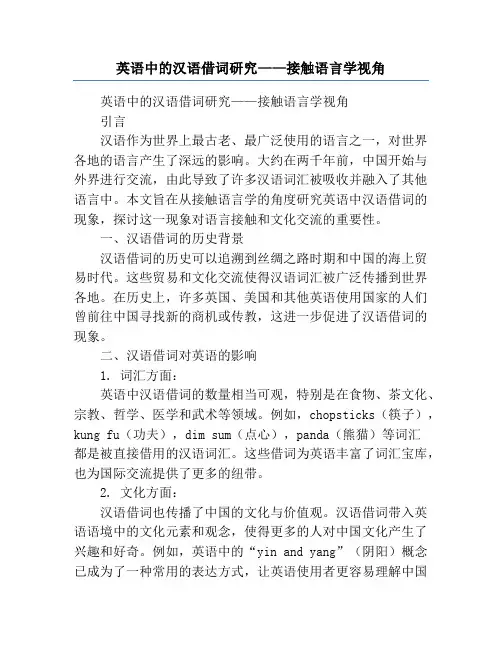
英语中的汉语借词研究——接触语言学视角英语中的汉语借词研究——接触语言学视角引言汉语作为世界上最古老、最广泛使用的语言之一,对世界各地的语言产生了深远的影响。
大约在两千年前,中国开始与外界进行交流,由此导致了许多汉语词汇被吸收并融入了其他语言中。
本文旨在从接触语言学的角度研究英语中汉语借词的现象,探讨这一现象对语言接触和文化交流的重要性。
一、汉语借词的历史背景汉语借词的历史可以追溯到丝绸之路时期和中国的海上贸易时代。
这些贸易和文化交流使得汉语词汇被广泛传播到世界各地。
在历史上,许多英国、美国和其他英语使用国家的人们曾前往中国寻找新的商机或传教,这进一步促进了汉语借词的现象。
二、汉语借词对英语的影响1. 词汇方面:英语中汉语借词的数量相当可观,特别是在食物、茶文化、宗教、哲学、医学和武术等领域。
例如,chopsticks(筷子),kung fu(功夫),dim sum(点心),panda(熊猫)等词汇都是被直接借用的汉语词汇。
这些借词为英语丰富了词汇宝库,也为国际交流提供了更多的纽带。
2. 文化方面:汉语借词也传播了中国的文化与价值观。
汉语借词带入英语语境中的文化元素和观念,使得更多的人对中国文化产生了兴趣和好奇。
例如,英语中的“yin and yang”(阴阳)概念已成为了一种常用的表达方式,让英语使用者更容易理解中国文化中的这一概念。
三、语言接触与文化交流的重要性1. 语言接触的作用:语言接触是语言演变和语言变化的关键驱动因素。
当不同的语言接触并相互影响时,会促进互相借用单词、语法甚至语音特征。
汉语借词的存在不仅反映了英语与汉语的接触,也是语言接触现象的产物。
2. 文化交流的推动:语言是文化的载体,它反映了人们的思维方式、社会结构、价值观念和习俗等。
通过语言学习和借词的过程,文化交流得以实现。
汉语借词在英语中的使用,使得东西方文化更加深入地融合,促进了国际间的交流与理解。
结论汉语借词现象在英语中的存在不仅为英语的发展和世界文化的多样性增添色彩,也为两种语言及文化之间的接触与交流提供了平台。
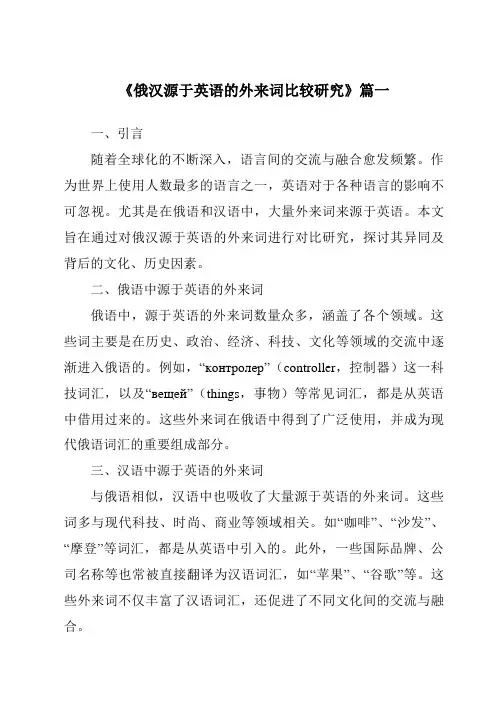
《俄汉源于英语的外来词比较研究》篇一一、引言随着全球化的不断深入,语言间的交流与融合愈发频繁。
作为世界上使用人数最多的语言之一,英语对于各种语言的影响不可忽视。
尤其是在俄语和汉语中,大量外来词来源于英语。
本文旨在通过对俄汉源于英语的外来词进行对比研究,探讨其异同及背后的文化、历史因素。
二、俄语中源于英语的外来词俄语中,源于英语的外来词数量众多,涵盖了各个领域。
这些词主要是在历史、政治、经济、科技、文化等领域的交流中逐渐进入俄语的。
例如,“контролер”(controller,控制器)这一科技词汇,以及“вещей”(things,事物)等常见词汇,都是从英语中借用过来的。
这些外来词在俄语中得到了广泛使用,并成为现代俄语词汇的重要组成部分。
三、汉语中源于英语的外来词与俄语相似,汉语中也吸收了大量源于英语的外来词。
这些词多与现代科技、时尚、商业等领域相关。
如“咖啡”、“沙发”、“摩登”等词汇,都是从英语中引入的。
此外,一些国际品牌、公司名称等也常被直接翻译为汉语词汇,如“苹果”、“谷歌”等。
这些外来词不仅丰富了汉语词汇,还促进了不同文化间的交流与融合。
四、俄汉外来词的异同(一)异处1. 词汇构成:俄语和汉语在词汇构成上存在差异。
俄语中的外来词往往保持了原词的形态和发音特点,而汉语中的外来词则更多地被本土化,融入了汉语的发音和语法结构。
2. 历史背景:俄汉外来词的历史背景也存在差异。
俄罗斯在苏联时期与西方国家的交流更为密切,因此从英语中引入的外来词较多;而中国在改革开放后与西方国家的交流逐渐增多,外来词也逐渐增多。
(二)同处1. 文化交流:无论是俄语还是汉语,源于英语的外来词都反映了不同文化间的交流与融合。
这些外来词不仅丰富了各自语言的词汇,还使人们更容易了解其他文化。
2. 词汇拓展:这些外来词的引入都为各自语言带来了新的词汇和表达方式,促进了语言的不断发展与演变。
五、结论通过对俄汉源于英语的外来词进行对比研究,我们可以发现,这些外来词在促进不同文化间的交流与融合、丰富各自语言的词汇等方面都起到了重要作用。
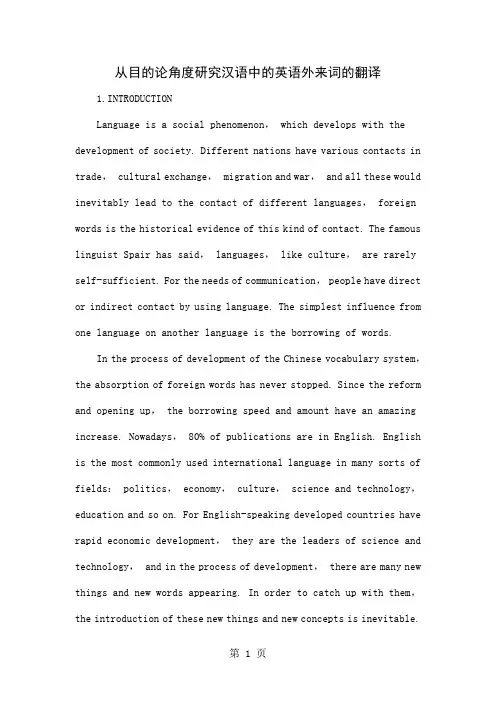
从目的论角度研究汉语中的英语外来词的翻译1.INTRODUCTIONLanguage is a social phenomenon, which develops with the development of society. Different nations have various contacts in trade, cultural exchange, migration and war, and all these would inevitably lead to the contact of different languages, foreign words is the historical evidence of this kind of contact. The famous linguist Spair has said, languages, like culture, are rarely self-sufficient. For the needs of communication, people have direct or indirect contact by using language. The simplest influence from one language on another language is the borrowing of words.In the process of development of the Chinese vocabulary system,the absorption of foreign words has never stopped. Since the reform and opening up, the borrowing speed and amount have an amazing increase. Nowadays, 80% of publications are in English. English is the most commonly used international language in many sorts of fields: politics, economy, culture, science and technology,education and so on. For English-speaking developed countries have rapid economic development, they are the leaders of science and technology, and in the process of development, there are many new things and new words appearing. In order to catch up with them,the introduction of these new things and new concepts is inevitable.So English loanword is continuously growing and has been a part of Chinese system that cannot be ignored.1.1 LoanwordWith the development of society including the changes of diplomatic policies and the development of economy and technology,language is also constantly updated. It appears a new word, called “loanword”.1.1.1 The definition of loanwordIn the well-known work Language, Leonard Bloomfield discussed borrowing. He divides language contact into three categories:cultural borrowing, intimate borrowing, and dialect borrowing. For intimate borrowing, he said that in any case, it is the non-dominant language that borrows language from the dominant language. The dominant language remains unchanged with few borrowing, while the non-dominant language fights against the dominant language. And in Edward Sapir’s book Language: An introduction to the Study of Speech, he did a research on borrowing from the point of view of descriptive linguistics.Word is the most sensitive element in the change and development of language system. Word will timely reflect some changes of society because new things are expressed by new words. With the development of world, there are great numbers of new ideas and new things cominginto China which must be expressed by language, so new words come. Many of them are borrowed from foreign languages, especially English. Therefore, the thesis is a study on English loan words in Modern Chinese. 1.1.2 The studies on English loanword Loan Words—Foreign Culture Emissary by Shi Youwei mainly focuses on various kinds of loan words from ancient times (3000 years ago) to now. He made a necessary arrangement for the complicated research outcomes of predecessors. He made a creative conclusion of new phenomena in loan words from an aspect of word-building,“Loan words have better and more specific condition in viewing than other words. For it is a word has both foreign form and native meaning. These two make up soul and appearance of a word which has a duality.”1.2 Comments and OpinionsFrom the literature review above, a great many studies have been made on loanword from various aspects: some methods of the loan word translation and contact between loan word and culture or some other subjects. Except for the dictionaries, there are not many studies on the translation, especially the translation based on theories, only slightly touched on. There should be further studies on the translation of loanword.Firstly, the study on loanword translation helps people geta more comprehensive understanding of the pronunciation, word,vocabulary and grammar of modern Chinese and the Skopos Theory provides a special point for better translations. Loanwords get into Chinese, influencing pronunciation, word, vocabulary, and grammar system, so by studying those words, people can understand Chinese in more aspects with a view of dynamic development.Secondly, it has a great meaning both in theory and in practice. In theory, a good translation is important in studying lexicology,and it is also helpful in studying sociology, psychology, and cross-cultural communication and other fields. In practice, with the help of this study, people can find more principles of translation of loanword, and find proper translation skills when translating loanword.2.CONCLUSIONSapir said,“The simplest kind of influence that one language may exert on another is the ‘borrowing’ of words.” (Sapir 202)At very beginning, borrowing foreign words was only to introduce the new things and concepts. Gradually, loanword became an important part of Chinese lexical system. And among these loanwords,English loanwords are the most. These English loanwords can be classified into four categories: transliteration loanword,liberal translation loanword, transliteration plus liberaltranslation loanword and direct loan of English words.The Skopos Theory was proposed in 1970s, the prime principle determining any translation process is the purpose of the overall translational action. In the process of translating English loanword, the basic purpose is to introduce new things and concepts of foreign countries to China. For a translational action may have a variety of purposes, the translators should be able to make a choice, so translators can follow the rules of the Skopos Theory. 希望以上资料对你有所帮助,附励志名3条:1、积金遗于子孙,子孙未必能守;积书于子孙,子孙未必能读。
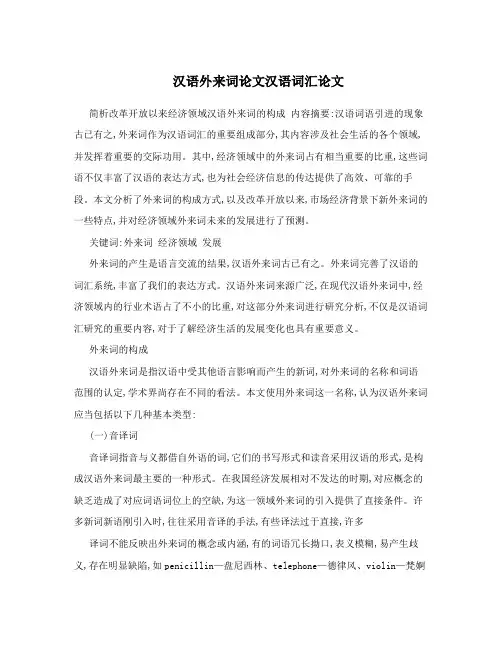
汉语外来词论文汉语词汇论文简析改革开放以来经济领域汉语外来词的构成内容摘要:汉语词语引进的现象古已有之,外来词作为汉语词汇的重要组成部分,其内容涉及社会生活的各个领域,并发挥着重要的交际功用。
其中,经济领域中的外来词占有相当重要的比重,这些词语不仅丰富了汉语的表达方式,也为社会经济信息的传达提供了高效、可靠的手段。
本文分析了外来词的构成方式,以及改革开放以来,市场经济背景下新外来词的一些特点,并对经济领域外来词未来的发展进行了预测。
关键词:外来词经济领域发展外来词的产生是语言交流的结果,汉语外来词古已有之。
外来词完善了汉语的词汇系统,丰富了我们的表达方式。
汉语外来词来源广泛,在现代汉语外来词中,经济领域内的行业术语占了不小的比重,对这部分外来词进行研究分析,不仅是汉语词汇研究的重要内容,对于了解经济生活的发展变化也具有重要意义。
外来词的构成汉语外来词是指汉语中受其他语言影响而产生的新词,对外来词的名称和词语范围的认定,学术界尚存在不同的看法。
本文使用外来词这一名称,认为汉语外来词应当包括以下几种基本类型:(一)音译词音译词指音与义都借自外语的词,它们的书写形式和读音采用汉语的形式,是构成汉语外来词最主要的一种形式。
在我国经济发展相对不发达的时期,对应概念的缺乏造成了对应词语词位上的空缺,为这一领域外来词的引入提供了直接条件。
许多新词新语刚引入时,往往采用音译的手法,有些译法过于直接,许多译词不能反映出外来词的概念或内涵,有的词语冗长拗口,表义模糊,易产生歧义,存在明显缺陷,如penicillin—盘尼西林、telephone—德律风、violin—梵婀玲等。
另外,由于音译外来词具有浓郁的外来文化色彩,所以就具有了一些特殊的功用—体现异域情调,迎合时代潮流,从而在经济尤其是商业销售领域大显身手,成为招徕顾客的重要手段。
如今音译外来词随处可见,如“波斯登”、“海尔”、“耐克”、“阿迪达斯”、“因特尔”、“麦当劳”、“肯德基”、“诺基亚”等。
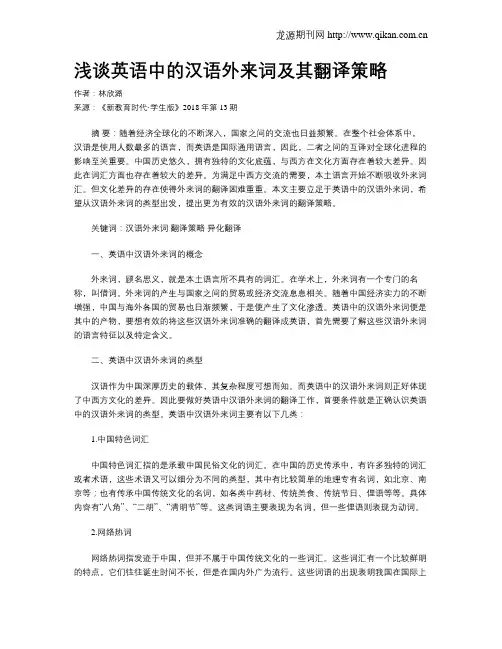
浅谈英语中的汉语外来词及其翻译策略作者:林欣潞来源:《新教育时代·学生版》2018年第13期摘要:随着经济全球化的不断深入,国家之间的交流也日益频繁。
在整个社会体系中,汉语是使用人数最多的语言,而英语是国际通用语言,因此,二者之间的互译对全球化进程的影响至关重要。
中国历史悠久,拥有独特的文化底蕴,与西方在文化方面存在着较大差异。
因此在词汇方面也存在着较大的差异。
为满足中西方交流的需要,本土语言开始不断吸收外来词汇。
但文化差异的存在使得外来词的翻译困难重重。
本文主要立足于英语中的汉语外来词,希望从汉语外来词的类型出发,提出更为有效的汉语外来词的翻译策略。
关键词:汉语外来词翻译策略异化翻译一、英语中汉语外来词的概念外来词,顾名思义,就是本土语言所不具有的词汇。
在学术上,外来词有一个专门的名称,叫借词。
外来词的产生与国家之间的贸易或经济交流息息相关。
随着中国经济实力的不断增强,中国与海外各国的贸易也日渐频繁,于是便产生了文化渗透。
英语中的汉语外来词便是其中的产物,要想有效的将这些汉语外来词准确的翻译成英语,首先需要了解这些汉语外来词的语言特征以及特定含义。
二、英语中汉语外来词的类型汉语作为中国深厚历史的载体,其复杂程度可想而知。
而英语中的汉语外来词则正好体现了中西方文化的差异。
因此要做好英语中汉语外来词的翻译工作,首要条件就是正确认识英语中的汉语外来词的类型。
英语中汉语外来词主要有以下几类:1.中国特色词汇中国特色词汇指的是承载中国民俗文化的词汇。
在中国的历史传承中,有许多独特的词汇或者术语,这些术语又可以细分为不同的类型,其中有比较简单的地理专有名词,如北京、南京等;也有传承中国传统文化的名词,如各类中药材、传统美食、传统节日、俚语等等。
具体内容有“八角”、“二胡”、“清明节”等。
这类词语主要表现为名词,但一些俚语则表现为动词。
2.网络热词网络热词指发迹于中国,但并不属于中国传统文化的一些词汇。
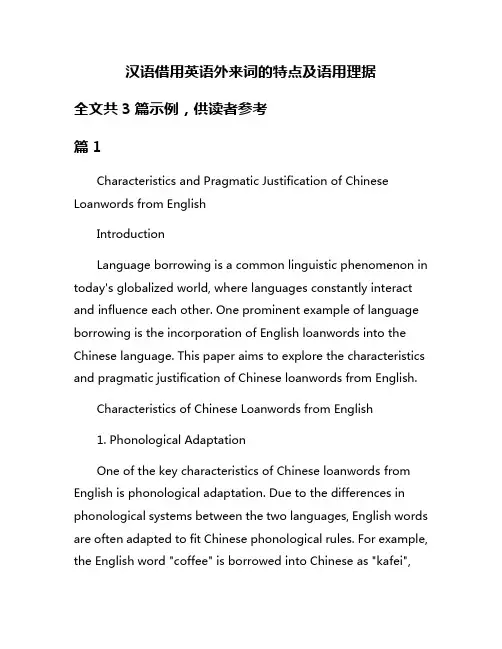
汉语借用英语外来词的特点及语用理据全文共3篇示例,供读者参考篇1Characteristics and Pragmatic Justification of Chinese Loanwords from EnglishIntroductionLanguage borrowing is a common linguistic phenomenon in today's globalized world, where languages constantly interact and influence each other. One prominent example of language borrowing is the incorporation of English loanwords into the Chinese language. This paper aims to explore the characteristics and pragmatic justification of Chinese loanwords from English.Characteristics of Chinese Loanwords from English1. Phonological AdaptationOne of the key characteristics of Chinese loanwords from English is phonological adaptation. Due to the differences in phonological systems between the two languages, English words are often adapted to fit Chinese phonological rules. For example, the English word "coffee" is borrowed into Chinese as "kafei",with the initial consonant cluster simplified and the final consonant dropped.2. Semantic ExtensionAnother characteristic of Chinese loanwords from English is semantic extension. Borrowed words may acquire new meanings or connotations in the borrowing language that are different from their original meanings in English. For example, the English word "cool" is borrowed into Chinese as "酷(ku)", which not only retains its original meaning of being stylish or fashionable but also takes on additional meanings such as being tough or nonchalant.3. Grammatical IntegrationChinese loanwords from English are also integrated into Chinese grammatical structures. This can involve the addition of Chinese particles or the use of loanwords in conjunction with Chinese words to create new expressions. For example, the English word "OK" is borrowed into Chinese as "OK", but is often used together with the Chinese word for good ("好hao") to form the phrase "好OK (hao OK)" with the meaning of very good or excellent.Pragmatic Justification of Chinese Loanwords from English1. Efficiency and PrecisionOne pragmatic justification for borrowing English loanwords into Chinese is efficiency and precision. English loanwords often represent concepts or ideas that do not have direct equivalents in Chinese, and borrowing these words allows for clear and concise communication. For example, the English word "internet" is borrowed into Chinese as "互联网(hulianwang)", which is more precise and efficient than describing the concept using multiple Chinese words.2. Globalization and ModernizationThe borrowing of English loanwords into Chinese also reflects the influence of globalization and modernization. As China becomes increasingly interconnected with the rest of the world, borrowing English loanwords helps to align Chinese vocabulary with international standards and facilitates communication with speakers of other languages. For example, the English word "smartphone" is borrowed into Chinese as "智能手机(zhineng shouji)", reflecting the modern technology and global trends.3. Cultural Exchange and InfluencesChinese loanwords from English also serve as a means of cultural exchange and influences between the two languages. Borrowing English loanwords allows for the incorporation of Western cultural concepts, trends, and products into the Chinese language, enriching the cultural landscape and broadening the linguistic repertoire of Chinese speakers. For example, the English word "hamburger" is borrowed into Chinese as "汉堡包(hanbaobao)", introducing a new culinary concept and food item to Chinese culture.ConclusionIn conclusion, the borrowing of English loanwords into Chinese is a complex linguistic phenomenon with distinctive characteristics and pragmatic justifications. The incorporation of English loanwords into Chinese reflects the dynamic nature of language and the ongoing interaction between different linguistic systems. Understanding the characteristics and pragmatic justifications of Chinese loanwords from English can provide insights into language contact, cultural exchange, and communication in our increasingly interconnected world.篇2Chinese has borrowed a significant number of English loanwords in recent decades, reflecting the influence of English as a global language. These loanwords have been absorbed into Chinese vocabulary and are commonly used in daily communication. In this article, we will explore the characteristics of Chinese loanwords from English and their pragmatics usage.Firstly, one notable characteristic of Chinese loanwords from English is their phonological adaptation. When borrowed into Chinese, English loanwords are often phonetically adapted to conform to Chinese phonology. For example, the word "computer" is borrowed as "电脑(diànnǎo)" in Chinese, where the original English sound of "kəmˈpjuːtər" is adapted to the Chinese phonetic system. This phonological adaptation makes it easier for Chinese speakers to pronounce English loanwords and integrate them into their language.Secondly, Chinese loanwords from English often retain their original meanings and usage. While some loanwords may acquire new meanings or connotations in Chinese, many English loanwords are used in Chinese with the same meaning as in English. For example, the word "coffee" is borrowed as "咖啡(kāfēi)" in Chinese, and both languages refer to the same beverage. This semantic consistency facilitates cross-linguisticcommunication and makes it easier for Chinese speakers to understand the meanings of English loanwords.Furthermore, the borrowing of English loanwords into Chinese reflects the integration of Western culture and technology into Chinese society. As English is widely used in business, technology, and academia, Chinese speakers often encounter English loanwords related to these fields. For example, terms like "internet" and "software" are borrowed into Chinese to reflect the growing importance of technology in modern society. By incorporating English loanwords, Chinese speakers can keep pace with global developments and access the latest information and technology.In terms of pragmatics usage, Chinese loanwords from English serve various communicative functions in different contexts. They are used to express modern concepts, ideas, and products that do not have direct equivalents in Chinese. For instance, terms like "email" and "smartphone" are borrowed into Chinese to describe new technologies that were not previously available. English loanwords are also used to convey a sense of sophistication, modernity, and internationalism, as English is often associated with these qualities.Moreover, Chinese loanwords from English are used to create a sense of prestige or exclusivity in certain contexts. For example, luxury brands often use English names or phrases to enhance their brand image and appeal to consumers who associate English with quality and fashion. By using English loanwords, companies can target a global audience and position themselves as innovative and cosmopolitan.In conclusion, the borrowing of English loanwords into Chinese reflects the dynamic nature of language and the interconnectedness of cultures in the modern world. Chinese loanwords from English exhibit phonological adaptation, semantic consistency, and cultural integration, making them an essential part of the Chinese vocabulary. By understanding the characteristics and pragmatics usage of English loanwords in Chinese, we can appreciate the influence of English on Chinese language and society.篇3Characteristics and Pragmatic Evidence of Borrowed English Loanwords in Chinese LanguageIntroductionLanguage borrowing is a common phenomenon in linguistic evolution, where one language adopts words or phrases from another language. In the case of the Chinese language, the influx of English loanwords has become increasingly prevalent in contemporary times. This document aims to explore the characteristics and pragmatic evidence of borrowed English loanwords in Chinese language.Characteristics of Borrowed English Loanwords in Chinese1. Phonological AdaptationOne of the key characteristics of borrowed English loanwords in Chinese is phonological adaptation. Due to the differences in phonetic systems between English and Chinese, English loanwords are often modified to fit Chinese phonological rules. This process may involve changing the pronunciation, tone, or syllable structure of the loanword to make it more accessible to Chinese speakers. For example, the English word "coffee" is adapted to "kafei" in Mandarin Chinese.2. Semantic ExtensionBorrowed English loanwords in Chinese often undergo semantic extension, where the original meaning of the word is adapted or expanded to suit the Chinese context. This can leadto variations in the interpretation of the loanword compared to its original English meaning. For instance, the English word "cool" is borrowed in Chinese to denote a trendy or fashionable concept, rather than its conventional meaning of low temperature.3. Integration into Chinese GrammarEnglish loanwords in Chinese are typically integrated into Chinese grammar structures to facilitate communication and comprehension. This may involve applying Chinese word order, syntax, or grammatical markers to the loanword. For example, the English loanword "shopping" becomes "gou wu" in Chinese, where the verb "to shop" is combined with the Chinese character for "to do" to form a Chinese compound word.Pragmatic Evidence of Borrowed English Loanwords in Chinese1. Social Prestige and GlobalizationThe presence of English loanwords in Chinese is often associated with social prestige and international status, as English is widely perceived as a global language of commerce, technology, and culture. The use of English loanwords in Chinese may convey a sense of modernity, sophistication, orcosmopolitanism, which can enhance social status and facilitate cross-cultural communication.2. Technical and Specialized VocabularyEnglish loanwords are frequently adopted in Chinese to express technical or specialized concepts in fields such as science, technology, and business. Due to the dominance of English as a language of innovation and advancement, Chinese speakers often rely on English loanwords to convey cutting-edge ideas, technologies, and practices. This pragmatic function of borrowed English loanwords in Chinese demonstrates their utility in facilitating precision and efficiency in communication.3. Pop culture and Media InfluenceThe infiltration of English loanwords into Chinese is also influenced by popular culture, media, and entertainment industries. English loanwords are often used in advertising, marketing, film, and music to create a sense of novelty, excitement, and global appeal. The adoption of English loanwords in Chinese can serve as a marketing strategy to attract a younger, more cosmopolitan audience and position products or brands as trendy and aspirational.ConclusionIn conclusion, the characteristics and pragmatic evidence of borrowed English loanwords in Chinese language reflect the dynamic interchange between languages, cultures, and communication practices in contemporary society. The integration of English loanwords into Chinese represents a complex process of linguistic adaptation, cultural negotiation, and social identification. By examining the phonological adaptation, semantic extension, grammar integration, as well as the social, technical, and cultural functions of borrowed English loanwords in Chinese, we gain insights into the diverse roles and meanings of language borrowing in a globalized world.。
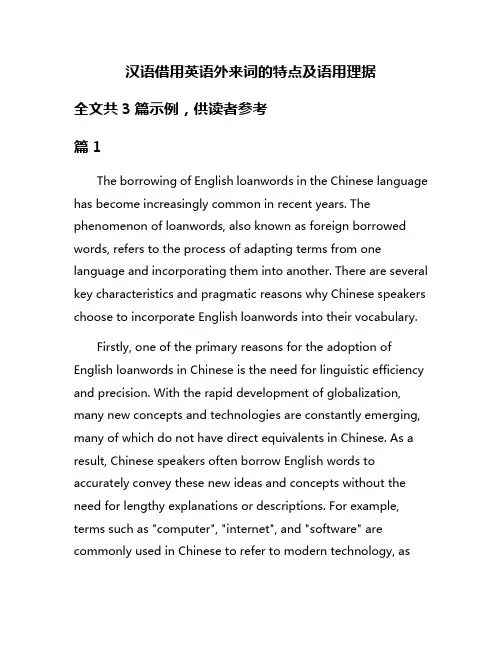
汉语借用英语外来词的特点及语用理据全文共3篇示例,供读者参考篇1The borrowing of English loanwords in the Chinese language has become increasingly common in recent years. The phenomenon of loanwords, also known as foreign borrowed words, refers to the process of adapting terms from one language and incorporating them into another. There are several key characteristics and pragmatic reasons why Chinese speakers choose to incorporate English loanwords into their vocabulary.Firstly, one of the primary reasons for the adoption of English loanwords in Chinese is the need for linguistic efficiency and precision. With the rapid development of globalization, many new concepts and technologies are constantly emerging, many of which do not have direct equivalents in Chinese. As a result, Chinese speakers often borrow English words to accurately convey these new ideas and concepts without the need for lengthy explanations or descriptions. For example, terms such as "computer", "internet", and "software" are commonly used in Chinese to refer to modern technology, asthere are no direct translations that adequately capture the nuances of these terms.Furthermore, the use of English loanwords in Chinese can also be attributed to the influence of Western culture and media. With the widespread popularity of Western entertainment, such as movies, music, and fashion, Chinese speakers are exposed to a wide range of English vocabulary on a daily basis. As a result, many English loanwords have become integrated into Chinese language usage, particularly among younger generations who are more likely to embrace Western culture.In addition, the adoption of English loanwords in Chinese can also serve as a form of social prestige or status symbol. By using English loanwords in their speech or writing, Chinese speakers may seek to demonstrate their education, sophistication, or international outlook. This is particularly evident in professional settings, where the use of English loanwords can convey professionalism and expertise in a particular field. For example, in the business world, terms such as "marketing", "strategy", and "management" are commonly used in Chinese to discuss business practices and concepts, as they are seen as more sophisticated and professional than their Chinese counterparts.Despite the benefits of incorporating English loanwords into Chinese, there are also potential drawbacks to consider. The overuse of English loanwords can lead to language pollution and the erosion of traditional Chinese vocabulary. In addition, the improper use or misinterpretation of English loanwords can result in misunderstanding or miscommunication among Chinese speakers.In conclusion, the borrowing of English loanwords in Chinese is a complex and multifaceted phenomenon that is influenced by a variety of linguistic, cultural, and social factors. While the use of English loanwords can facilitate communication and enhance linguistic diversity, it is important for Chinese speakers to use these loanwords judiciously and in appropriate contexts to avoid language degradation and confusion.篇2The borrowing of English loanwords into Chinese has become increasingly common in recent years, reflecting the growing influence of English in the global arena. This trend has not only enriched the Chinese language, but also brought about changes in the way Chinese speakers communicate. In this article, we will explore the characteristics of Chinese loanwords from English and their pragmatic functions.One of the key features of Chinese loanwords from English is their adaptability to the Chinese language system. While loanwords from other languages may undergo extensive alterations to fit into Chinese phonology and morphology, English loanwords often retain their original pronunciation and spelling. This is due to the relatively high degree of similarity between English and Mandarin phonetic systems, as well as the widespread use of the Latin alphabet in Chinese transliteration.Another characteristic of English loanwords in Chinese is their selective adoption based on semantic gaps in the Chinese lexicon. Many English loanwords are introduced into Chinese to express concepts or referents that do not have exact equivalents in Chinese. For example, the word "wifi" is borrowed into Chinese as "无线网络" (wúxiàn wǎngluò) to denote wireless intern et, a concept that did not exist in traditional Chinese culture. By borrowing English loanwords, Chinese speakers are able to fill lexical gaps and communicate more efficiently in a globalized context.In addition to semantic considerations, the pragmatic functions of English loanwords in Chinese are also worth noting. English loanwords are often used to convey a sense of modernity, technology, or sophistication in Chinese discourse. For example,the use of English loanwords such as "cool" or "fashion" in Chinese may signal a speaker's desire to appear trendy or cosmopolitan. In this way, English loanwords serve as markers of social identity and cultural prestige in contemporary Chinese society.Furthermore, English loanwords in Chinese can also facilitate communication in specific domains or discourse communities. For example, in the fields of science, technology, and business, English loanwords are commonly used to refer to specialized terms and concepts that are universally recognized. By incorporating English loanwords into their discourse, Chinese speakers can enhance clarity and precision in communication with international colleagues and audiences.In conclusion, the borrowing of English loanwords into Chinese reflects the dynamic nature of language contact and adaptation in a globalized world. The characteristics of Chinese loanwords from English, such as adaptability, selective adoption, and pragmatic functions, demonstrate the complex interplay between linguistic systems and social contexts. As English continues to exert influence on Chinese language and culture, the phenomenon of loanword borrowing is likely to continueevolving and shaping the linguistic landscape of contemporary China.篇3With the increasing globalization and influence of Western culture, the phenomenon of borrowing English loanwords into Chinese has become more and more common in recent years. This practice of incorporating foreign words into the Chinese language is known as "汉语借用英语外来词" (Hànyǔ jièyòngYīngyǔ wàiláicí).There are several distinctive characteristics of the borrowing of English loanwords in Chinese. Firstly, the loanwords are usually adapted to fit the phonetic and syllabic structure of the Chinese language. This often involves transliterating the English word into Chinese characters that approximate its pronunciation. For example, the English word "coffee" is borrowed into Chinese as "咖啡" (kāfēi), which closely mirrors the sound of the original word.Secondly, loanwords in Chinese often undergo semantic shifts or extensions in meaning. This can be due to cultural differences between English-speaking countries and China, as well as the need to express new concepts or ideas that do nothave existing equivalents in Chinese. For example, the English word "cool" has been borrowed into Chinese to mean "fashionable" or "stylish," rather than its original literal meaning of low temperature.Additionally, the borrowing of English loanwords in Chinese is often influenced by social factors and trends. For instance, certain industries or professions may adopt English terms to give an air of modernity or sophistication. This is particularly common in fields such as technology, business, and popular culture, where English is often seen as a symbol of innovation and progress.From a linguistic perspective, the incorporation of English loanwords into Chinese can be seen as a form of code-switching or bilingualism. It allows Chinese speakers to draw on the resources of both languages to express themselves more effectively and adapt to the changing linguistic landscape. It also reflects the dynamic nature of language and the constant evolution of vocabulary to meet the needs of contemporary society.In conclusion, the borrowing of English loanwords in Chinese reflects the ongoing interaction between different cultures and languages in our increasingly interconnected world. By analyzingthe characteristics and language usage of these loanwords, we can gain insights into the ways in which language shapes and reflects our social reality.。
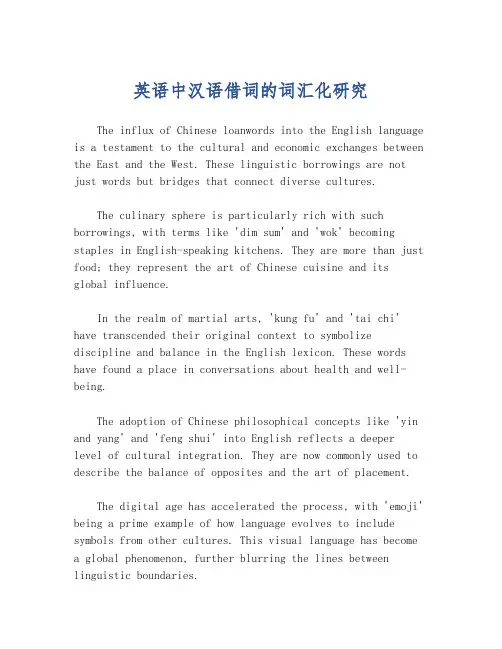
英语中汉语借词的词汇化研究The influx of Chinese loanwords into the English language is a testament to the cultural and economic exchanges between the East and the West. These linguistic borrowings are not just words but bridges that connect diverse cultures.The culinary sphere is particularly rich with such borrowings, with terms like 'dim sum' and 'wok' becoming staples in English-speaking kitchens. They are more than just food; they represent the art of Chinese cuisine and its global influence.In the realm of martial arts, 'kung fu' and 'tai chi' have transcended their original context to symbolize discipline and balance in the English lexicon. These words have found a place in conversations about health and well-being.The adoption of Chinese philosophical concepts like 'yin and yang' and 'feng shui' into English reflects a deeperlevel of cultural integration. They are now commonly used to describe the balance of opposites and the art of placement.The digital age has accelerated the process, with 'emoji' being a prime example of how language evolves to include symbols from other cultures. This visual language has become a global phenomenon, further blurring the lines between linguistic boundaries.The study of lexical borrowing is not just about understanding the mechanics of language; it's about appreciating the rich tapestry of human interaction that shapes our global community.As we delve deeper into this research, we uncover the subtle ways in which languages evolve, adapt, and enrich each other, creating a vibrant mosaic of global communication.。
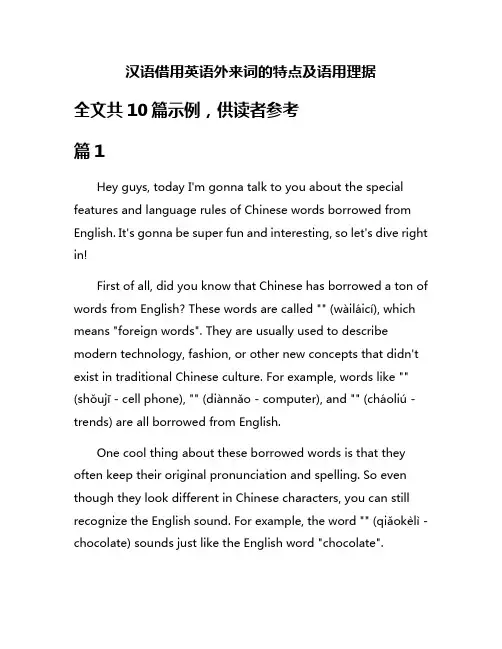
汉语借用英语外来词的特点及语用理据全文共10篇示例,供读者参考篇1Hey guys, today I'm gonna talk to you about the special features and language rules of Chinese words borrowed from English. It's gonna be super fun and interesting, so let's dive right in!First of all, did you know that Chinese has borrowed a ton of words from English? These words are called "" (wàiláicí), which means "foreign words". They are usually used to describe modern technology, fashion, or other new concepts that didn't exist in traditional Chinese culture. For example, words like "" (shǒujī - cell phone), "" (diànnǎo - computer), and "" (cháoliú - trends) are all borrowed from English.One cool thing about these borrowed words is that they often keep their original pronunciation and spelling. So even though they look different in Chinese characters, you can still recognize the English sound. For example, the word "" (qiǎokèlì - chocolate) sounds just like the English word "chocolate".Another interesting thing is that borrowed English words can be used in a more casual or slangy way in Chinese. For example, instead of saying "" (xièxie - thank you), you might hear people say "Thx" or "" (xièxie xièxie - thanks thanks) to be more casual and friendly.In conclusion, the borrowed English words in Chinese add a modern and international flavor to the language. They make it easier to talk about new things and communicate with people from different cultures. So next time you hear a borrowed English word in Chinese, remember how cool and useful it is! Thanks for listening, guys!篇2I'm going to talk about some cool words we use in Chinese that we borrowed from English! We call them "" or "" in Chinese, which means "loanwords". These words make our language more interesting and international. Let me tell you some of them and explain why we use them.First, let's talk about ""(qiǎo kè lì), which means chocolate in English. We borrowed this word from English because it's easier to say and remember than the Chinese word for chocolate, ""(zhū gǔ lì). Plus, it sounds fancy and cool, just like chocolate itself!Next, we have ""(shǒu jī), which means mobile phone in English. This word is also borrowed from English because it's a popular and modern invention. The English word "mobile phone" is too long and hard to remember, so we use "" instead. It's short, sweet, and easy to say!Another example is ""(kā fēi), which means coffee in English. We borrowed this word because coffee is a popular drink all over the world. The Ch inese word for coffee, "" (kā fēi), is easy to pronounce and sounds similar to the English word. It's a perfect match!Lastly, let's talk about ""(bǐng gān), which means cookie in English. We borrowed this word because cookies are a delicious snack tha t everyone loves. The Chinese word for cookie, "" (bǐng gān), is easy to say and sounds cute. It's a fun word to use when we're talking about yummy treats!In conclusion, borrowing words from English makes our language more colorful and fun. These loanwords are easy to say, remember, and use in everyday conversations. They help us connect with people from different cultures and countries. So next time you hear a loanword in Chinese, remember that it'sthere to make our language more interesting and international! Thanks for listening!篇3Hello everyone! Today, I'm going to talk about the special features of borrowing English words in Chinese. It's really cool how we use English words in Chinese, isn't it?First of all, do you know why we borrow words from English? Well, sometimes Chinese doesn't have a word for something new, like "computer" or "internet", so we borrow the English word instead. This makes it easier for us to talk about these modern things. It's like we're adding new words to our language!Another reason we borrow English words is because they sound cool. Have you ever noticed how some English words just sound more exciting or fun than Chinese words? That's why we like to use them in Chinese. It makes our language more interesting and diverse.But wait, there's more! When we borrow English words, we often give them our own Chinese twist. We might change the pronunciation a little bit, or use them in a different way. This shows how creative we are with language!So, next time you hear an English word in Chinese, remember that it's not just a random choice. There's a reason why we borrow words from English, and it's all part of the beauty of language. Let's keep having fun with English words in Chinese!篇4Hello everyone! Today we're going to talk about Chinese borrowed words from English and their characteristics and usage.First of all, you might be wondering, what are borrowed words? Well, borrowed words are words that come from one language to another language. In this case, English has loaned some words to Chinese, and they have become a part of everyday language.One of the characteristics of Chinese borrowed words from English is the pronunciation. Since Chinese and English are very different languages, the pronunciation of borrowed words might be a bit different from the original English word. For example, the English word "computer" is borrowed into Chinese as "" (diàn nǎo), with a different pronunciation but the same meaning.Another characteristic is the written form of borrowed words. When English words are borrowed into Chinese, they are oftenwritten using Chinese characters that sound similar to the English word. For example, the English word "coffee" is borrowed into Chinese as "" (kā fēi), using characters that sound like the English word.In terms of usage, Chinese borrowed words from English are often used in everyday conversation, especially among young people. They add a trendy and modern element to the language. For example, words like "" (shǒu jī) for "cell phone" or "" (dān shēn) for "single" are commonly used in Chinese conversations.In conclusion, Chinese borrowed words from English have become an important part of the language, adding a fresh and modern touch to everyday communication. So next time you hear someone using a borrowed word in Chinese, don't be surprised – it's just the language borrowing a little bit from English to make things more interesting! Thank you for reading!篇5Hello everyone! Today I'm going to talk about a super cool topic - the borrowed words from English in Chinese!You know, Chinese is a really old language with thousands of characters, but lately we've been borrowing a lot of words from English. It's like mixing two awesome things together!it makes us sound super smart and cool. Like when we use the word "coffee" instead of the traditional Chinese word for it. It's like we're saying, "Hey, I'm hip and trendy!"Another reason is that some English words just fit better in certain situations. Like when we say "OK" instead of "" or "." It just sounds more natural, you know?But we also have to be careful with how we use borrowed words from English. We need to make sure they make sense in Chinese and that people understand what we're trying to say. Otherwise, it can get really confusing!Overall, borrowing words from English can be a fun way to mix things up in our language. So next time you hear someone use an English word in Chinese, just remember - it's all about being cool and trendy!篇6Well, you know, there are some really cool words in Chinese that actually come from English! It's like a fun little language exchange between the two languages. These borrowed words, or loanwords, bring a whole new flavor to Chinese and make it even more awesome.is because it gives Chinese speakers a way to talk about new things that didn't exist before. Like, for example, the word "computer" in Chinese is "" (diànnǎo), which comes from the English word "computer." Can you imagine trying to explain what a computer is without using that word? It would be so hard!Another reason for borrowing words from English is because it makes Chinese sound more modern and hip. You know, like when you say "cool" or "awesome" in Chinese, it just adds that extra bit of coolness to your language. Words like "" (shǒujī) for "cell phone" or "" (wǎnghóng) for "internet celebrity" make Chinese sound super trendy and up-to-date.But wait, there's more! Borrowing words from English can also make it easier for Chinese people to connect with the rest of the world. Like, when you hear words like "" (kāfēi) for "coffee" or "" (yīnyuè) for "music," it makes it easier for Chinese speakers to talk to people from other countries. It's like a secret code that helps us all understand each other better.So, next time you hear a borrowed word in Chinese, remember that it's not just a random word – it's a cool little bridge between Chinese and English that makes both languages even more awesome. Keep on borrowing, Chinese!篇7Once upon a time, there were lots of English words that came to Chinese, and they became our friends! These English loanwords brought us new ways to express ourselves and helped us connect with the world. Let's learn more about them!First of all, let's talk about the special characteristics of English loanwords in Chinese. These words are like guests from another country, bringing with them a unique charm. They are often used in trendy and fashionable contexts, making our language more colorful and diverse. For example, "coffee" is a loanword from English that has become a popular drink in China. People can now enjoy a nice cup of coffee while chatting with friends or working on their laptops.Moreover, English loanwords have also enriched our language by providing us with new vocabulary. For instance, words like "internet" and "computer" have become essential in our daily lives. Thanks to these loanwords, we can talk about modern technology and stay connected with others around the world. Isn't it cool how these words have made our lives easier and more convenient?In addition, the use of English loanwords in Chinese reflects the influence of globalization. As our world becomes more interconnected, it is important for us to embrace different cultures and languages. By using English loanwords in our daily conversations, we are showing our openness to new ideas and our willingness to adapt to a changing world.In conclusion, English loanwords have become an integral part of the Chinese language, adding richness and diversity to our vocabulary. Let's continue to embrace these words and celebrate the beauty of cultural exchange. Let's keep learning and exploring the world through language!篇8Hello everyone! Today I want to talk about some Chinese words that borrow from English. I think it's super cool how languages can mix together like that!One of the words that we use in Chinese that comes from English is "" (diànnǎo), which mea ns computer. Isn't that neat? We just took the English word "computer" and made it our own! It's so fun to see how words from one language can be used in another.Another word is "" (shǒujī), which means cellphone. We got that from the English words "cell" and "phone" and put them together to make a new word in Chinese. I love how creative language can be!Some people might wonder why we borrow words from English instead of just using Chinese words. Well, sometimes it's easier to use a borrowed word because it's already familiar to a lot of people. Plus, it's just fun to mix languages together and see what comes out!I think it's really cool how languages can influence each other like that. It shows how connected we all are, even if we speak different languages. And who knows, maybe one day we'll see even more words borrowed from English in Chinese! Language is always changing and growing, just like us.So next time you hear a word in Chinese that sounds like English, remember that it's just a fun way for languages to mix and play together. Isn't that awesome? I think so! See you next time, friends!篇9My topic today is about the use of English loanwords in Chinese and why do we use them. So, what are Englishloanwords? They are words borrowed from English into Chinese and used in our daily conversations. For example, we often say "coffee" instead of (kāfēi), and "pizza" instead of (pīsà).There are several reasons why we use English loanwords in Chinese. Firstly, it makes us sound more trendy and modern. Using English words can make us seem cool and international. It's like we are keeping up with the latest trends and fashions. Secondly, some English loanwords are just easier to pronounce or remember than their Chinese counterparts. For example, it's much simpler to say "OK" than (hǎo de) in some situations. Lastly, the use of English loanwords can also help save time and space. Instead of using a long Chinese sentence, we can just use a short and simple English word to convey the same meaning.However, we should also be careful when using English loanwords in Chinese. Sometimes, overusing these words can make us sound pretentious or show-offy. We should always consider the context and the audience before using English loanwords in our conversations.In conclusion, the use of English loanwords in Chinese can be fun and useful. It adds a unique flavor to our language and helps us express ourselves in a more interesting way. But remember, moderation is key! Let's keep using Englishloanwords in Chinese wisely and make our language more diverse and colorful.篇10Oh! Hi everyone! Today I want to talk about something super cool – Chinese words borrowed from English! Do you know that there are so many English words that we use in Chinese? It's so fun to see how languages can mix together like that.One of the reasons why we borrow English words is because they often describe new things or concepts that we don't have words for in Chinese. For example, have you heard of "" (shǒujī)? It means "mobile phone" in English. But in Chinese, we just say "" because it's easier to say and everyone knows what it means.Another reason why we borrow English words is because they sound cool and modern. Like "" (cháoliú) – it means "trend" in English. Doesn't it sound so trendy and hip? It's like we're saying, "Hey, I know what's cool and I'm up-to-date!"Some people might say that borrowing English words is a bad thing because it might make our language less pure. But I think it's okay as long as we still keep our own Chinese words too.It's like mixing different colors to make a beautiful painting –each color is important.So, next time you hear a Chinese word that sounds like English, remember that it's just our way of adding a little extra flavor to our language. Isn't that neat? Let's keep learning and exploring new words together! Bye-bye!。
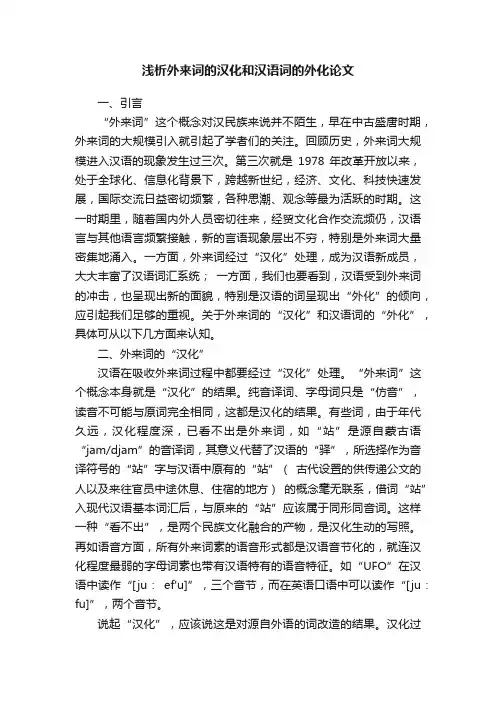
浅析外来词的汉化和汉语词的外化论文一、引言“外来词”这个概念对汉民族来说并不陌生,早在中古盛唐时期,外来词的大规模引入就引起了学者们的关注。
回顾历史,外来词大规模进入汉语的现象发生过三次。
第三次就是1978 年改革开放以来,处于全球化、信息化背景下,跨越新世纪,经济、文化、科技快速发展,国际交流日益密切频繁,各种思潮、观念等最为活跃的时期。
这一时期里,随着国内外人员密切往来,经贸文化合作交流频仍,汉语言与其他语言频繁接触,新的言语现象层出不穷,特别是外来词大量密集地涌入。
一方面,外来词经过“汉化”处理,成为汉语新成员,大大丰富了汉语词汇系统;一方面,我们也要看到,汉语受到外来词的冲击,也呈现出新的面貌,特别是汉语的词呈现出“外化”的倾向,应引起我们足够的重视。
关于外来词的“汉化”和汉语词的“外化”,具体可从以下几方面来认知。
二、外来词的“汉化”汉语在吸收外来词过程中都要经过“汉化”处理。
“外来词”这个概念本身就是“汉化”的结果。
纯音译词、字母词只是“仿音”,读音不可能与原词完全相同,这都是汉化的结果。
有些词,由于年代久远,汉化程度深,已看不出是外来词,如“站”是源自蒙古语“jam/djam”的音译词,其意义代替了汉语的“驿”,所选择作为音译符号的“站”字与汉语中原有的“站”(古代设置的供传递公文的人以及来往官员中途休息、住宿的地方)的概念毫无联系,借词“站”入现代汉语基本词汇后,与原来的“站”应该属于同形同音词。
这样一种“看不出”,是两个民族文化融合的产物,是汉化生动的写照。
再如语音方面,所有外来词素的语音形式都是汉语音节化的,就连汉化程度最弱的字母词素也带有汉语特有的语音特征。
如“UFO”在汉语中读作“[ju:ef'u]”,三个音节,而在英语口语中可以读作“[ju:fu]”,两个音节。
说起“汉化”,应该说这是对源自外语的词改造的结果。
汉化过程是不同语言之间抗衡与妥协、异质和同化的过程。
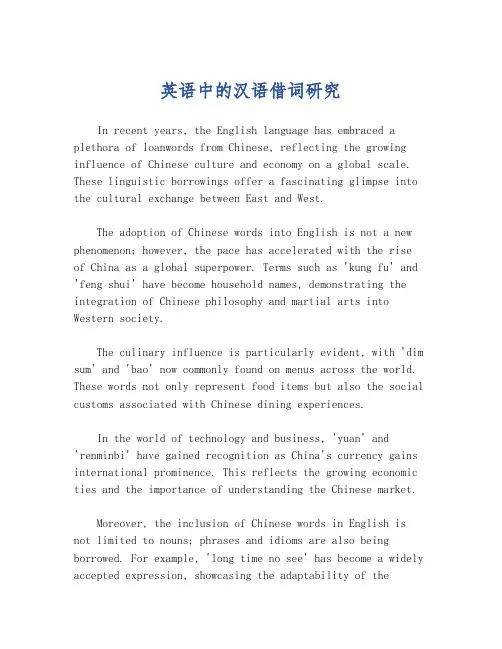
英语中的汉语借词研究In recent years, the English language has embraced a plethora of loanwords from Chinese, reflecting the growing influence of Chinese culture and economy on a global scale. These linguistic borrowings offer a fascinating glimpse into the cultural exchange between East and West.The adoption of Chinese words into English is not a new phenomenon; however, the pace has accelerated with the rise of China as a global superpower. Terms such as 'kung fu' and 'feng shui' have become household names, demonstrating the integration of Chinese philosophy and martial arts into Western society.The culinary influence is particularly evident, with 'dim sum' and 'bao' now commonly found on menus across the world. These words not only represent food items but also the social customs associated with Chinese dining experiences.In the world of technology and business, 'yuan' and'renminbi' have gained recognition as China's currency gains international prominence. This reflects the growing economic ties and the importance of understanding the Chinese market.Moreover, the inclusion of Chinese words in English is not limited to nouns; phrases and idioms are also being borrowed. For example, 'long time no see' has become a widely accepted expression, showcasing the adaptability of theEnglish language to incorporate phrases from other cultures.The study of these linguistic borrowings is crucial for understanding cultural dynamics and the evolution of language. It reveals how English, as a global language, continues to adapt and incorporate elements from other cultures, enriching its vocabulary and reflecting the interconnectedness of our world.In conclusion, the borrowing of Chinese words intoEnglish is a testament to the dynamic nature of language andits ability to bridge cultural gaps. As we continue towitness this linguistic phenomenon, it serves as a reminderof the rich tapestry of human expression and the ever-evolving nature of communication.。
从目的论角度研究汉语中的英语外来词的翻译1.INTRODUCTIONLanguage is a social phenomenon, which develops with the development of society. Different nations have various contacts in trade, cultural exchange, migration and war, and all these would inevitably lead to the contact of different languages, foreign words is the historical evidence of this kind of contact. The famous linguist Spair has said, languages, like culture, are rarely self-sufficient. For the needs of communication, people have direct or indirect contact by using language. The simplest influence from one language on another language is the borrowing of words.In the process of development of the Chinese vocabulary system,the absorption of foreign words has never stopped. Since the reform and opening up, the borrowing speed and amount have an amazing increase. Nowadays, 80% of publications are in English. English is the most commonly used international language in many sorts of fields: politics, economy, culture, science and technology,education and so on. For English-speaking developed countries have rapid economic development, they are the leaders of science and technology, and in the process of development, there are many new things and new words appearing. In order to catch up with them,the introduction of these new things and new concepts is inevitable.So English loanword is continuously growing and has been a part of Chinese system that cannot be ignored.1.1 LoanwordWith the development of society including the changes of diplomatic policies and the development of economy and technology,language is also constantly updated. It appears a new word, called “loanword”.1.1.1 The definition of loanwordIn the well-known work Language, Leonard Bloomfield discussed borrowing. He divides language contact into three categories:cultural borrowing, intimate borrowing, and dialect borrowing. For intimate borrowing, he said that in any case, it is the non-dominant language that borrows language from the dominant language. The dominant language remains unchanged with few borrowing, while the non-dominant language fights against the dominant language. And in Edward Sapir’s book Language: An introduction to the Study of Speech, he did a research on borrowing from the point of view of descriptive linguistics.Word is the most sensitive element in the change and development of language system. Word will timely reflect some changes of society because new things are expressed by new words. With the development of world, there are great numbers of new ideas and new things cominginto China which must be expressed by language, so new words come. Many of them are borrowed from foreign languages, especially English. Therefore, the thesis is a study on English loan words in Modern Chinese. 1.1.2 The studies on English loanword Loan Words—Foreign Culture Emissary by Shi Youwei mainly focuses on various kinds of loan words from ancient times (3000 years ago) to now. He made a necessary arrangement for the complicated research outcomes of predecessors. He made a creative conclusion of new phenomena in loan words from an aspect of word-building,“Loan words have better and more specific condition in viewing than other words. For it is a word has both foreign form and native meaning. These two make up soul and appearance of a word which has a duality.”1.2 Comments and OpinionsFrom the literature review above, a great many studies have been made on loanword from various aspects: some methods of the loan word translation and contact between loan word and culture or some other subjects. Except for the dictionaries, there are not many studies on the translation, especially the translation based on theories, only slightly touched on. There should be further studies on the translation of loanword.Firstly, the study on loanword translation helps people geta more comprehensive understanding of the pronunciation, word,vocabulary and grammar of modern Chinese and the Skopos Theory provides a special point for better translations. Loanwords get into Chinese, influencing pronunciation, word, vocabulary, and grammar system, so by studying those words, people can understand Chinese in more aspects with a view of dynamic development.Secondly, it has a great meaning both in theory and in practice. In theory, a good translation is important in studying lexicology,and it is also helpful in studying sociology, psychology, and cross-cultural communication and other fields. In practice, with the help of this study, people can find more principles of translation of loanword, and find proper translation skills when translating loanword.2.CONCLUSIONSapir said,“The simplest kind of influence that one language may exert on another is the ‘borrowing’ of words.” (Sapir 202)At very beginning, borrowing foreign words was only to introduce the new things and concepts. Gradually, loanword became an important part of Chinese lexical system. And among these loanwords,English loanwords are the most. These English loanwords can be classified into four categories: transliteration loanword,liberal translation loanword, transliteration plus liberaltranslation loanword and direct loan of English words.The Skopos Theory was proposed in 1970s, the prime principle determining any translation process is the purpose of the overall translational action. In the process of translating English loanword, the basic purpose is to introduce new things and concepts of foreign countries to China. For a translational action may have a variety of purposes, the translators should be able to make a choice, so translators can follow the rules of the Skopos Theory. 希望以上资料对你有所帮助,附励志名3条:1、积金遗于子孙,子孙未必能守;积书于子孙,子孙未必能读。
浅谈汉语与英语间相互词汇的借用现象及其对比分析的论文论文关键词:词汇借用语言借用语言接触论文摘要:语言间的相互接触就会在语言间产生语言借用,最典型的是词汇间的借用。
我们国家作为一个文明古国,文化博大精深,随着这么多年的积累和我国综合实力的增强,我国对世界的影响越来越巨大。
汉语在世界上的地位也逐渐增强,英语作为世界通用语,越来越多的受到汉语的影响。
随着英汉两种语言与文化的日渐频繁的接触,英语与汉语间词汇的借用亦有增多的趋势。
本文从语源范围和类别、借入方式和途径等方面对英语和汉语中各自的借词进行分析.并进一步围绕语源、数量及其对语言本身的影响等方面对英语中的汉语借词和汉语中的英语借词进行了对比分析。
一、什么是借词借词是语言改变的自然过程,一种语言需要复制别的语言来增加字典里的新词,所以有了借词,就像一种“偷窃”。
借词就是一种复制(trask,1996)。
笔者通过前人的研究总结出:借词是两种不同文化背景的语言,当它们在接触的时候因为存在一种文化中另一种文化所没有的词汇或则为了更好的交流和融入另一种文化而产生的词汇,即为借词。
二、借词产生的历史原因以及汉英借词现在的发展(一)借词产生的背景thrughutitshistry,englishhasdadntratithanylanguages ,resultinginvaryingdegreesfhangeinthelanguage.英语在一千五百多年的发展中,从汉语以及其他语言吸收了大量的词汇。
公元十一世纪,诺曼底人从法国北部入侵,征服了英格兰。
诺曼底统治者成为英国国王,致使当时的法语成为英国上层阶级的语言。
在长达几百年法国人的统治下,大量的法语词汇涌入英语,尤其反映在上层建筑领域中。
例如:gvernent,rie,eney等。
当然也有反映社会生活方面的词汇,如:at,habit等。
随着历史的发展,这一时期借入的法语词汇在发音和拼写上已完全与英语同化了,而且不少词已成为表达社会生活各方面不可缺少的词语。
改革开放以来英汉借词之间的互相影响王之强指导老师:崔尔胜淮南师范学院中文与传媒系2012摘要:由于中国自1978年实行改革开放政策,中国同外国之间的接触和交流达到前所未有的频繁。
这种在政治、经济、文化各个领域的接触和交流,更表现为语言之间的相互借鉴。
本文就是以英汉两种语言之间的借词为例,来探讨改革开放以来,英汉两种语言之间发生的变化。
关键词:改革开放;英语借词;汉语借词;影响The Each Other Between English and Chinese Load Words Influence:The Period Form 1978 to the PresentStudent:Wang zhi-qiangInstructor:cui er-shengChinese and media department;Huainan normaluniversity;2012Abstract:Because china from 1978 of reform and opening-up policy .china with foreign contact sand exchanges between the unprecedented frequently. This not only displayed in political, economic, cultural all areas of contact and communication , more performance for the interaction between the language for reference. This paper is to English and Chinese load words between two languages as example. This paper discusses since the reform and opening up both English and Chinese language happened between the change.Key word:reform and opening up;English loanwords;Chinese loanwords ;influence引言世界上大多数语言都存在着向其他语言借用词语的现象。
浅析英语语言学中的汉语外来词
摘要:随着历史的发展,世界各国之间的交流在不断加深,民族与民族之间的联系也在日益密切。
但是当某种物品的名称在交流的过程中无法沟通时,就会产生外来词汇,从发音到意思的借鉴。
而在英语中,这种情况出现的则更加频繁,本文就英语语言学中的汉语外来词进行研究。
关键字:英语;语言学;外来词
英语中的外来词主要来源于indo-european,也有部分来自于oriental languages,其中汉语就是其中之一。
作为一种民族与民族之间的文化传播现象,英语中出现汉语外来词早已经有了上千年的历史。
特别是随着各种英汉字典的不断翻新,进入英语中的汉语外来词汇也在不断在增多。
一英语对汉语外来词的借用方式
英语从汉语中借鉴了大量的词语,但是在借鉴方式却各不相同,其中主要表现在以下三个部分:
(一)音译类。
英语中音译类的汉语外来词是英语吸收汉语最直接也是最快的一种方式。
在最早的时期,英语中音译类的外来词就是汉语中的方言与英语共同组合而成。
但是因为在汉语中语音的不同,所以在英语中音译类的外来词也会有一些不同的改变[1],例如有的有着比较特别的地方性色彩,有的则是现代汉语的拼音。
如shiching(诗经)、congou(功夫茶)、ginseng(人参)等。
(二)意译类。
英语中意译类的汉语外来词是使用英语的本身意
思来表达中国特有的某种事物。
这一类的外来词的数量不多,但是随着我国加入国际世贸组织后,中西方交流的日益增多,我国特有的事物也逐渐被国外西方国家所接受,于是英语中意译类的汉语外来词越来越多,例如long march(长征)、four books《(四书》)、five classics《(五经》)、wall-poster(大字报)、paper tiger(纸老虎)等。
(三)音加意类。
英语中音加意类的汉语外来词的数量很少,一般是由音译类与意译类共同组成。
例如coca-cola(可口可乐)、beijingopera(京剧)、mini(迷你)、soymilk(豆奶)、geometry (几何)、pekingduck(北京烤鸭)、simmons(席梦思)等。
二英语中汉语外来词的语言学特征
(一)语音特征。
英语中的汉语外来词大多采用音译形式,也可以采用意译形式。
因为不管是音译形式还是意译形式,它们在表达的是英语中本身所不存在的一种有关中国物品的一种新的概念,例如big-pot-rice-system(大锅饭制度)、go ba(锅巴)、the great leap forward(大跃进)、work-point(工分)等。
而在英语中的汉语音译类的外来词中,有的外来词与汉语中的汉语拼音基本相似或者完全相似,这些词也比较容易让人意识到其具体来历,例如:yamen(衙门)、jin(斤)。
其有差异的地方往往也是最初在吸收外来词汇的过程中根据汉语拼音中的相似组合而成,或者根据地方的方言,例如:tea(茶)、litchi(荔枝)、kungfu(功夫)、yoga(瑜伽)、tai chi(太极)等。
(二)词义特征。
英语中的汉语外来词在很大程度上都可以保持原有的词义,但是有的却只能利用地名的方式来表示当地特有的产品的名称[3],例如:satin的意思是泉州城梓墩出的缎子、pekin 的意思是北京特产,但是也指北京烤鸭或者北京宽条绸子、nankin 意思是南京产的本色布裤子。
而有的英语中的汉语外来词所表达的意思却与其本身的意义相差很大,例如:shanghai是中国的城市名称,但是随着时间与意义上的改变逐渐的扩大发展成为”胁迫”、”拐骗”的意思。
三研究英语中汉语外来语的社会语言学意义
(一)丰富语言内容。
研究英语中汉语的外来词汇可以使社会语言学变得更加丰富,新的语种可以使文化之间的沟通变得更加便捷,更可以赋予其新的历史内涵与时代特征,使其成为一种独特的社会现象,丰富语言种类的内容性与文化性。
(二)沟通彼此的文化桥梁。
外来词语是原有语言中的一种沟通桥梁,它使两种语言之间的关系变得更加亲密,联系更加密切,沟通更加频繁。
英语中的汉语外来语眼可以传播中国的文化,使中国的文化逐渐扩散到世界各地,加强了国际之间的合作与交流[4]。
并且英语在发展的过程中不断的吸收各地的文化精髓,早期独具一格,所以其在汉语借鉴的过程中也可以学习其海纳百川的精神。
语言作为其历史发展阶段必不可少的环节,他可以反映出一个国家在历史的繁荣与昌盛,语言的多元化与开放化可以证明一个国家在文化驾驭方面的意思性,这种意识性正是一个国家对外界文化吸收程
度的考察点。
对于学习英语的中国学生而言,这种英语中的汉语外来语可以吸引他们的学习兴趣,也可以培养他们的爱国情操;而外国人学习英语中的汉语外来语则可以使他们更好地了解中国历史
文化的博大精深。
(三)培养自身的民族意识。
通过对于英语中汉语外来词的研究,可以使学生更加认真地学习和使用英语,也有利于中西方文化的交流与沟通,使学生有意识的区分文化之间的区域性,也使国际社会更加了解中国的文化,增强国人的民族自豪感。
参考文献
[1]张子敬.语言文化管理[m]
[2]谭梅敏.中西方文化汇聚[m]
[3]赵秀峰.语言的派生能力分析[j]
[4]lothario,watts.on english linguistic reference method of chinese [j]。